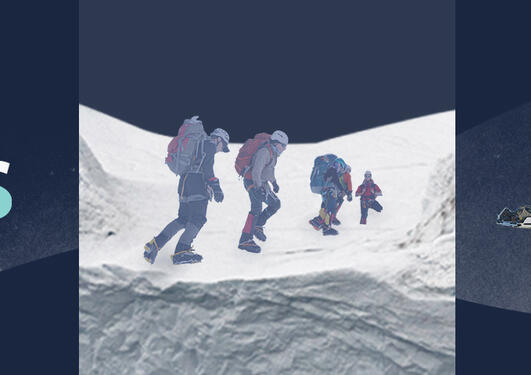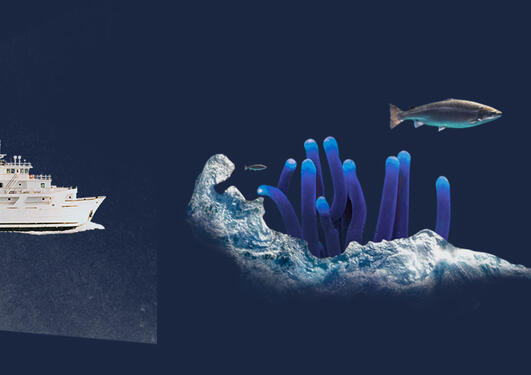Research possibilities for the MSCA SEAS postdoctoral research fellow in marine larval biology
The information on this page is a supplement to the complete advertisement of the position in the recruitment-portal Jobbnorge. The full advertisement of this position in Jobbnorge will be available after august 1, and linked from this webpage. Call deadline is October 31, 2022.
Main content
Key information
One position | SEAS postdoctoral research fellow at Department of Biological Sciences |
Jobbnorge title | MSCA SEAS postdoctoral research fellow in marine larval biology |
Topical frame | Settling biology and substrate preference in sessile marine organism |
Supervisor | Professor Henrik Glenner |
Mobility | For an incoming or outgoing candidate (see mobility rules) |
Unit of employment | Department of Biological Sciences at University of Bergen |
Group affiliation |
Thematic area and contact
This position is connected to the thematic area of settling biology of marine invertebrate larvae. Focus will be on the environmental factors that influences the substrate preferences in sessile organisms along a north-south costal climate gradient. The study area includes the European Atlantic coast from northern Norway in the north to the Mediterranean Sea in the south. Applicants are welcome to suggest research ideas within topics such as:
- Settlement studies of barnacles and/or related crustacean groups
- Modified settlement behavior of invasive species
- Latitude effects on substrate preference
- Dispersal and population genetics related to choice of settling site
The position is open to an incoming or outgoing candidate (see mobility rules).
The successful candidate will be employed at the Department of Biological Sciences and included in the Fjord and Coastal Ecology research group.
Information about the supervisor, research group and research possibilities for the fellow is available below. For further details about the research possibilities please contact Professor Henrik Glenner.
Research possibilities and resources
The supervisor
Glenner is a marine evolutionary biologist using invertebrates, crustaceans, especially barnacles, to study evolutionary processes. Barnacles are unique among crustaceans since they all, without exceptions, alternates between a free-living larva stage and an irreversible attached adult and detailed lifecycle studies are essential in attempting to understand their morphology, larval biology, ecology, and evolution. As such, barnacles are therefore exceptional models for the general problem of settlement of marine larvae, the ecology and spread of sessile organisms and therefore also for understanding the biology of invasive species and the applied problem of marine fouling.
A wide range of methods are applied in Glenner's laboratory including phylogenetics, population genetics, settlement, and field experiment as well as light and electron microscopy. Consequently, the research conducted relies on expertise from many areas of biological research in a highly international, multidisciplinary approach.
Glenner has large experience in leading and coordinating national and international projects such as the ongoing Norwegian research council/EU financed infrastructural EU project EMBRC, where Glenner currently is leading the Norwegian node (EMBRC_Norway).
The research group
The Fjord and Coastal Ecology Group studies environmental impacts on individuals, species, populations, and ecosystems with an emphasis on the marine environment. Within the group, there is expertise in biosystematics, benthic and pelagic ecology as well as ecological modeling. The research group is very diverse and multidisciplinary in nature and will, therefore, undoubtedly be inspiring for a new postdoc with a type of project such as the announced.
Available infrastructure
The field environment: Department of Biology at the University of Bergen is adjacent to a complex of fjords renowned as a northern European biodiversity hotspot. Biodiversity here is high, with common occurrence of species rarely found in other places. The marine infrastructure: From the University of Bergen's marine biology station at Espegrend (MBSE), there is access to research vessels with excellent opportunities for marine sampling. Advanced aquarium, culturing facilities, flumes, and wet labs are available at the main campus and at MBSE.
The molecular Laboratory facilities: Molecular analyses. Generation of molecular data: DNA sequences and microsatellite data can be generated using Sanger sequencing and Next Generation Sequencing (NGS – Ion Torrent platform) at the Biodiversity laboratory, at the Dept. of Biology, UiB and the Norwegian Sequencing Centre in Oslo (NSC). NSC provides a core facility with NGS sequencing services using several instruments from Illumina and Pacific Biosciences (PacBio).
EMBRC: UiB and MBSE are part of the European Research Infrastructure of Marine biological institutions (EMBRC) which stretches along the coast of the European Atlantic from Tromsø in the north to Portugal in the south and further into the Mediterranean. The successful candidate is encouraged to make use of this European infrastructure in his research project.
Research possibilities for the fellow - topical frame
The postdoctoral fellow position is connected to the thematic area of settling biology of marine invertebrate larvae. Focus will be on the environmental factors that influences the substrate preferences in sessile organisms along a north-south costal climate gradient. Larvae of sessile marine organisms are exceptional by being irreversibly attached to a substrate as adults, and this basic condition has profound consequences for their biology. To ensure the survival of the future adult organism, the last free-swimming larval stage, possesses a set of adaptations that enables it to detect, investigate, and finally attach to a suitable substrate. Hence, choice of general settling substrate and specific attachment site in marine larvae is not a random process. Substrate preference is typically species or even population dependent, but studies suggest that substrate preference vary even on an individual level. This is interesting from both an ecological and an evolutionary point of view, since it hints how species may adapt to both latitudinal and temporal environmental changes, including man made ones. It is therefore the hope that the successful candidate can develop a project that can illuminate this problem area. Relevant model species will be selected as reference points and for deeper investigations. The research will rely on field and lab studies along the Norwegian and/or the European Atlantic coast line, potentially combined with experiments, molecular analyses, modelling, and comparative work. Although the supervisor has his main expertise within barnacles, it must be emphasised that the candidate does not have to work with this taxon as long as the study area of the suggested project is well related to the "announcement". A project on larval sensory biology in connection with settling in other relevant sessile invertebrate taxa would, for example, fall within the scope of the project.
Potential for policy impact
In this project, there are opportunities to provide a science-based framework to politicians and decision makers regarding the impact of increased greenhouse gas emissions, temperature rises, ocean acidification, and other man-made changes on key parts of the life cycle of marine invertebrates. And as a derivation of this, it will be possible to provide predictions of how much it will take for sustainability goals to be affected.
Teaching
BIO has a wish to facilitate teaching opportunities for the candidate and on topics related to the proposed research topic. The successful candidate can, after employment, apply for up to one year extension if qualified to teach in relevant courses at BIO.
Potential UiB groups at other departments that may offer a co-supervisor (for cross-disciplinary work)
See the full advertisement in Jobbnorge
The full advertisement in Jobbnorge will be available from august 1, 2022, until call deadline October 31.
Important general information
Please be aware
- That until August 1st 2022 (official call opening), the information on this page must not be considered as final, as adjustments may be done! There might also be minor adjustments in the Guide for applicants and the templates needed for applying.
- That the application process is time-demanding and requires a close dialogue with name-given available faculty supervisor or contact who, close to the deadline, must sign a supervisor match declaration if an application is to be eligible.
- That some fields of research, especially within sensitive technology areas, might be enforced by Norwegian and international regulations regarding Control of the Export of Strategic Goods, Services and Technology. Candidates who by assessment of the application and attachment are seen to conflict with the criteria in these regulations might be prohibited from recruitment to UiB.

